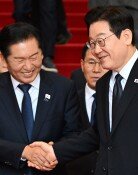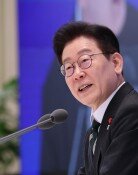Bosworth: N. Korean missile launch is to attract attention
Bosworth: N. Korean missile launch is to attract attention
Posted March. 05, 2014 03:22,
The Dong-A Ilbo met Stephen Bosworth, the former U.S. Special Representative for North Korea Policy and chairman of the U.S.-Korea Institute at Johns Hopkins School of Advanced International Studies, last Friday when he visited Korea to participate in a forum. Coincidentally, his trip to Korea was made a day after North Korea launched four missiles.
Asked of his opinion about North Koreas provocation immediately occurred after the reunions of separated families, he flatly said, I didnt expect it, but it was no surprise because it is just a show (for North Korea) to tell the international community that the country doesnt want to be forgotten. He supports to have dialogues with North Korea as a solution for many North Korean issues, in particular, dialogues between two Koreas. He is to contribute columns to Dong-A Ilbo from April. Below is the interview with him.
-How do you see the situation in North Korea after the execution of Jang Song Thaek?
I think it is very stable. North Korea will continuously work to develop the nuclear program and missiles. Nevertheless, it is not a good idea to stop having dialogue. We (the U.S.) dont know about Kim Jong Un very much. Neither does South Korea. (We) knew a little about his father Kim Jong Il, but nothing about this young leader.
-I heard you met North Korean high-ranking officials including Ri Yong Ho, the vice minister of Foreign Affairs, in Berlin and London last October.
They said they wanted to resume talks with the United States. When I asked them if they were ready to come to the table with the nuclear issues, they said Yes. Of course, this doesnt mean that the regime will abandon the nuclear program. Still, it is worth having talks with North Korea. Both the U.S. and South Korea are taking a cautious approach now. Besides, the Obama administration is not keen to have a dialogue (with North Korea.)
-Is a dialogue really necessary?
Definitely. (We) shouldnt ignore North Korea. It would never say, Okay, well give up on nuclear. Lets have a dialogue.
-Have you heard anything about the resumption of six party talks?
Nothing. The U.S. doesnt have any special plan and South Korea is not doing anything about it either as far as I know.
-Do you have any plan to visit North Korea?
No. I`ve visited North Korea (in 2009), but currently dont have any plan for revisiting.
-Does it seem to you that the social climate for reunification is gaining momentum in Korea?
For sure, there are more talks about it. However, no one talks about what should be done to achieve reunification. It seems people just think reunification as something good to happen.
-What is the most important thing for reunification? Information, money, or public consensus?
It is to strengthen the economy of South Korea. And the next is to have the South Korean people mentally prepared for reunification.
The following is about international relations.
-What about the U.S.-China relations?
Though I am an optimist, I see difficulties going forward. Both the U.S. and China should make compromises. They have many common interests, such as economy, stability and peace. Still, things will not be easy.
-What about Japanese Prime Minister Abe?
(Strongly shaking his head) I think he is making a big mistake. Intellectuals in the U.S. including myself believe that Japan should have better relations with South Korea and China. What Abe is doing now is clearly in favor of Japan only.
-How is the atmosphere of the U.S. intellectual community?
There are many criticisms. Not different in Washington.
-But there is nothing Washington can do about it, isnt there?
That is why people are more critical of Japan. Both South Korea and Japan are important allies for the U.S. Strained relations between the two are a problem to the U.S.
-How did the American people respond to South Korean President Park Geun-hyes visit to the U.S. last year?
(The response was) very positive. She represents todays South Korea very well. She is a great leader in the international arena.
-In what aspects?
I think she is strong inside. She always thinks of the nation. Despite the tragic assassination of her parents, she has led a consistent life. In Korea where few women leaders exist, she has become the nations first woman president. That fact alone is sufficient to gain the respect of people around the world.
-Do you think the U.S. will soon have a woman president?
Yes. Hillary may be the one.
-What do you think of her?
If she runs for the presidency, shell win. The time will come when the U.S. has a woman president. If South Korea can do it, why not the U.S.? (laughter)







